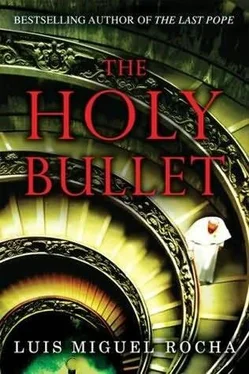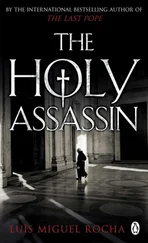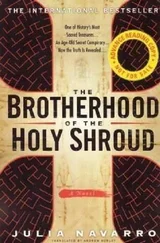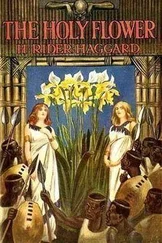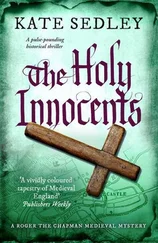This Tuesday morning was no exception. Several people were entering the small church, most hardly bothering to admire the facade, perhaps accustomed to it, as if it were only one more familiar fortification, like the city itself where they live. Perhaps the Mass, which had already started, made them hurry. The few who looked at the facade were undoubtedly tourists, admiring the painting of Christ Crucified, wept over by Mary and Mary Magdalene, the common scene reproduced from diverse angles and artistic and subjective interpretations of the mother and spouse who weep for their dead son and husband who will rise again on the third day. Above the portico is a plaque that reads: Indulgencia plenaria quotidiana perpetua pro vivis et defunctis -a priestly and papal pronouncement of daily privilege for the living and dead within this sacred temple. The priest, who had just crossed the bridge, entered the church. Its interior reflected something of its exterior simplicity, though it possessed priceless relics, although fewer in number compared with those in other Roman churches.
This is not the first time Father Rafael Santini has celebrated Mass here, although it’s not the parish assigned to him. That lies to the north of Rome in a small village he barely knows-for reasons that don’t concern us.
This cool morning they were celebrating the silver anniversary of Father Carrara’s appointment as parish priest. He was Rafael’s friend of many years and colleague in service as priest and in other matters we won’t mention now. Rafael, though a priest, liked people, especially women, as has been common since the High Middle Ages. Men like Rafael look as old as they wish. We could be specific and say thirty-eight years, completed on the sixteenth day of April, but who can know with certainty his age and birthday? Anyone seeing him celebrating the Eucharist now at the altar of Saint Gregory of Divine Mercy could not fail to notice a certain indifference, unusual in a priest. The speed with which he read the missal bordered on a senseless mumble. He read the sermon without emotion, like a public official reading a traffic code or a student reciting the multiplication tables in front of the teacher.
What might seem to the common believer a lack of vocation was not really so. Let the man who has just entered and seated himself in the last row speak. His black cassock and clerical collar identify him as an ordinary priest. Notice his elderly appearance. He could say much about Rafael Santini’s vocation in the zealous service of the Holy Mother Church, although he has never made his acquaintance before entering this church. Everything that guarantees the loyalty and competence of Father Rafael is based on trustworthy, eyewitness accounts that, in his opinion, leave no room for doubt.
Let the celebration of the Eucharist hurry to the conclusion when Rafael utters the phrase desired by some and not by others, “May you go in peace,” sometimes “Go in the peace of the Lord,” or simply “Good-bye.”
“Amen,” said the chorus of faithful present, making the sign of the cross. Morning Mass was over. Everyone got up to leave. The priest, who had entered during the reading of the Epistle of Paul to the Philippians, followed Father Rafael to the sacristy. Once inside, he was surprised by the emptiness. Not the lack of decoration, since this is perfectly within the Roman parameters, but the human absence. Rafael, whom he had seen a few minutes ago heading in this direction, was not there…
“To what do I owe the honor?” he heard a voice from behind him.
“Ah, Father Rafael. How are you?” he greeted him after turning around. “You frightened me.”
“I didn’t mean to.”
“I know. They warned me you were unpredictable.”
“What brings you here?” he asked directly. One of Rafael’s peculiarities, without categorizing it as a defect or virtue, was to waste no words on banalities. This visit could only mean one thing. They could dispense with formalities, though that didn’t mean he’d be impolite.
“Father Carrara’s not here?” the visitor asked.
“He’ll come to afternoon Mass.”
“Good. My name is Phelps. I am an English priest assigned to the Vatican. James Phelps. It’s a pleasure to meet you.” He held out his hand and received Rafael’s strong, firm grip in return.
“Rafael Santini.”
Father Phelps couldn’t hide his embarrassment. He was not accustomed to these affairs.
“Relax, Father Phelps,” Rafael reassured him in a serious tone. “It’s all very simple. Just give me the information they gave you or where to find it, and your work is over. The rest is my problem.”
“Yes. I wish it were so simple. We have a serious problem.”
“They all are.”
“My orders are to take you immediately to the Holy See.”
“Seriously? What an honor. It’ll be charming to see the Vatican. Who are we going to see?”
The Englishman wasn’t pleased with the sarcasm, but his respect and admiration for Rafael, picked up through stories told by people in the know, were too much to allow him the luxury of feeling irritated.
“His Holiness Pope Benedict the Sixteenth.”
THE MEETING
February 1981
There are some who say that the meeting between the two men did not occur in 1981, but earlier, in 1979 or 1980, or even in March 1982. Others confirm a meeting in 1981, but disagree about the month, saying August, September, or November, with no evidence to support that claim. Some of the defenders of the month of February disagree over the exact date of the meeting, and scarcely two voices are in accord about the content and tone of the conversation. As far as the location, the majority claim it took place in the office of one or the other. Another point of historical discord is the discussion itself. One faction defends a calm, cordial conversation, while another precisely the contrary. There are even those who reject all these theories and claim that such an encounter never took place. With history it’s all a question of point of view and imagination.
In fact the supposed meeting between the two men occurred in the office of the first, at eleven o’clock on the morning of Tuesday, February 3. The second man showed up very early at the door of the office, not knowing that the American slept very late. He should have known his habits, since the man whom he waited for was not exactly a novitiate. At that time he had exercised his duties for more than ten years. No meeting was officially recorded.
Thus, after two and a half hours of waiting, the American finally appeared at the office.
“Good morning, Your Eminence,” said the assistant who opened the door promptly so the American wouldn’t dirty his chaste hand on the doorknob.
“Good morning.” The harsh voice of someone who has risen too early. The best time in bed for this man was during the morning, the warmth of the sheets, the sound of daily movements, no guilty conscience… Someone was sitting inside his office.
“The cardinal has been waiting for you a long time,” the secretary told him quickly, nervously. The American had temper tantrums, especially in the morning. This time, though, he restrained himself from throwing any accusing look at the unlucky functionary. What could he do? Refuse a cardinal of the Holy Mother Church?
The other was seated in front of the desk, his face expressionless, absorbed in the documents he’d brought with him. The American went to his desk without looking at him once.
“Good morning, Your Eminence,” the recently arrived one said in a neutral tone. “I don’t recall that we had an appointment this morning.”
“We didn’t,” replied the other without raising his head.
Читать дальше
